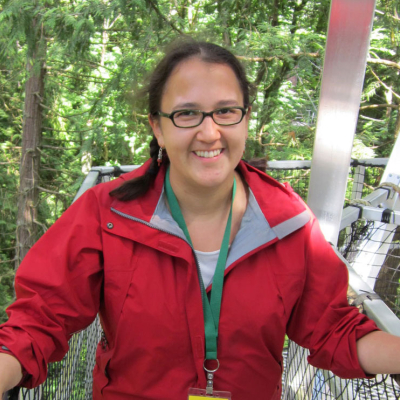Leigh Anne Mathieson (BSc 2012)
Part 6 of the “Made on Haida Gwaii” Series by April Diamond Dutheil.
“Big complex problems don’t scare me anymore, they’re exciting,” tells computer scientist Leigh-Anne Mathieson.
For the past three years Leigh-Anne has been conducting bio-computing research at the University of British Columbia. Her research scope explores the computational difficulty of problems that model the folding of ribonucleic acid (RNA) molecules. Although RNA research can have implications for strengthening knowledge of life sciences- including genetics, biology and human health - Leigh-Anne’s research is more theoretical and sets the stage for understanding how RNA functions at its most basic level.
“I was interested in computer science quite early, but I didn’t love the field until I did research,” she admits. Doing research allowed Leigh-Anne to work on complex real-life problems, “a big part of the appeal was that the answers weren’t at the back of the textbook,” she adds.
Recently finishing a Bachelor of Science degree in computer science from the University of British Columbia, Leigh-Anne has presented at numerous North American conferences, received research grants from the Natural Sciences and Engineering Research Council of Canada and is a contributor to academic publications (the first in 2010, with a second on its way). Among 350 applicants, Leigh-Anne was also selected as one of 36 students who will take part in a computational biology research project this summer at Oxford University.
A competent problem solver, Leigh-Anne is aware of the social forces dictating the direction and limitation of the computer science field. A relatively new area of study, women, first nations and those from rural communities are largely under-represented (in some cases absent) from the computer sciences. As a young Haida woman from rural Canada Leigh-Anne is disrupting her industry’s status quo in the best possible ways - contributing a refreshing message that she belongs in the computer sciences.
“I love computer science,” she says, “but I do think that within [computer science] if you have the same people from the same backgrounds it’s going to be difficult to get ground-breaking results.” The solution? “Computer science needs people from rural communities,” she says, “people raised in rural communities have unique perspectives - if we don’t start to support these different experiences we won’t be able to move forward in the field.” Leigh-Anne responds similarly when asked about the role of women in computer science, “we can’t afford not to have more women involved,” she says.
Calling for diverse viewpoints to be included in all industries, Leigh-Anne remarks, “I find it scary to think that this same group of people, at all levels, are the ones who are predominantly shaping our world.”
Leigh-Anne knew from an early age that she wanted to do something in science and engineering. She came to this conclusion while attending grade eight at George M. Dawson high school. Knowing where her passion was, Leigh-Anne left home to complete her grade 11 and 12 science courses, “moving to Vancouver was a big adjustment for me,” she says.
Being from Haida Gwaii “will always have a huge influence in my life,” says Leigh-Anne, “because I was raised on Haida Gwaii I got the unique and rare opportunity to be raised by the whole community.” Familiar with the benefits of belonging to a community, Leigh-Anne strives to foster a similar sense of community, regardless of where she may be in the world.
Growing up on Haida Gwaii has helped Leigh-Anne understand the importance of finding a work-life balance, “as soon as I left home I was struck by how people in the cities were doing so many things at once and always rushing around- it was hard to tell what was important to them.” Influenced by the realities of her homeland, Leigh-Anne shares that it may be more valuable to “think realistically, slow down and decide what is most important so that you can do those things very well.”
After Oxford, Leigh-Anne’s next move includes finding work in the computer sciences, then pursuing a master’s degree when the time is right. Leigh-Anne’s long term vision is to support young students from rural communities who are considering a career in science or technology, “in rural communities it’s harder to grow to love the sciences, the opportunities aren’t there,” she says.
How can young people from our communities love science? How can they get the skills to pursue a science and technology career- instead of playing catch up with students who have access to more resources? These are all questions that Leigh-Anne wants answers to. Serving as an inspiration for many northerners, she provides us with a valuable message. A career in science and technology is possible for rural youth – but for their aspirations to flourish they deserve appropriate programming and support.
Age: 22
Current location: London, England
Philosophy: Make changes you intend to keep for the rest of your life.
Source: Haida Gwaii Observer, Rabble.ca, Project Gwaii
The Made on Haida Gwaii series tells the stories of fifty talented young people who call Haida Gwaii home.In this vast country, our major urban centres tend to soak up most of the attention. This collection of success stories, about young people living on these beautiful but remote islands off the Pacific coast, aims to disrupt the dominant myths of what it means to grow up in Canada’s North.
